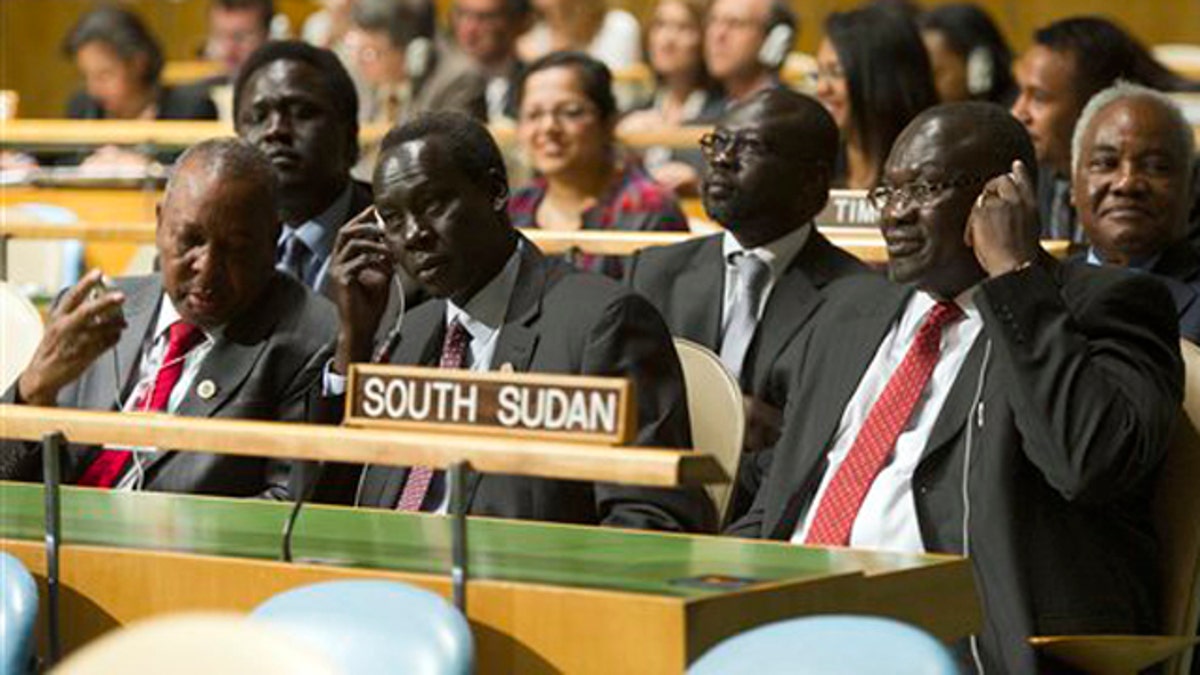
In this photo provided by the United Nations, members of the delegation of the Republic of South Sudan, led by Vice President Riek Machar Teny-Dhurgon, right, are seated in United Nations General Assembly, Thursday, July 14, 2011. (AP/U.N.)
Newly independent South Sudan became the 193rd member of the United Nations on Thursday, welcomed into the international community amid an uneasy peace with the Sudanese government in the north.
General Assembly President Joseph Deiss banged a gavel signaling South Sudan's admission to the world body by acclamation as diplomats burst into applause.
"Today, we are firmly entrenching South Sudan in the community of nations," Deiss said.
Independence for the country's eight million people on Saturday was the climax of a 2005 peace agreement that ended decades of civil war with the Arab-dominated north and called for a referendum in which South Sudan voted overwhelmingly for secession.
But many differences remain between the north and the mainly ethnic African south over borders and wealth-sharing among other things.
Military standoffs in the contested border region of Abyei and new fighting in South Kordofan -- a state in Sudan with many south-supporting residents -- already threaten to spark a new north-south conflict.
Secretary-General Ban Ki-moon praised Sudan's President Omar al-Bashir and South Sudan's President Salva Kiir for ensuring that the referendum and its results were honored.
"It is imperative that you resolve outstanding differences with the same pragmatism and leadership that you have each shown so far," Ban said. "The well-being and future prosperity of each depends on the other. South and North share a common destiny -- they must see a future as true partners, not rivals."
Although South Sudan is now expected to control more than 75 percent of what was Sudan's daily oil production, it has no refineries and southern oil must flow through the north's pipelines to reach market. The young nation is also one of the poorest and least developed countries in the world, with only a couple of dozen miles (kilometers) of paved roads, very low literacy, and a lack of medical facilities.
South Sudan's Vice President Riek Machar praised al-Bashir's for his courage in accepting the referendum and applauded his government for being the first to recognize the south's independence.
"We do not harbor bitterness towards our former compatriots," Machar said. "We remain partners in peace and committed to the principles of good neighborliness. We must work out our differences through dialogue and in a spirit of cooperation."
Sudan's U.N. Ambassador Sudan's U.N. Ambassador Daffa-Alla Elhag Ali Osman didn't address the outstanding issues but said "this is a new page and we hold out our hands."
"We and our brothers in South Sudan have left bitterness and the ruins of war behind us and we're looking to the future," he said. "We will make every effort to bring whatever assistance we can to the Republic of South Sudan."
U.S. Ambassador Susan Rice pledged American support for South Sudan as it works "for an enduring peace rooted in coexistence between two viable states.
After speeches by representatives of all regional groups, hundreds of diplomats and U.N. staff walked outside for another ceremony where South Sudan's flag -- including a yellow star symbolizing unity -- was raised for the first time, again to loud applause.
